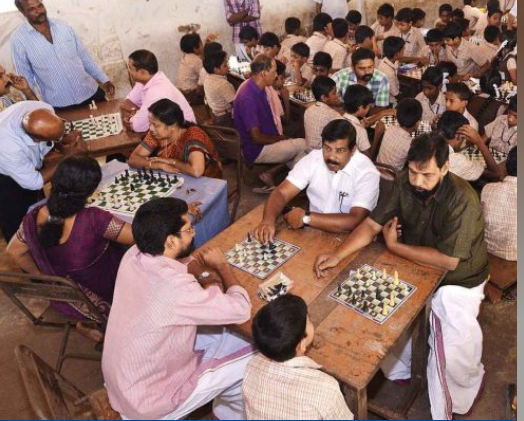In the 1960s, Marottichal, a quiet village near Thrissur in Kerala, was grappling with a crisis.
Alcoholism and gambling were rampant.
Families struggled. Violence and disputes were common.
Hope seemed distant.
With few entertainment options and easy access to illicit liquor, the village was caught in a cycle that threatened to ruin generations.
One Man’s Unconventional Solution
Enter C Unnikrishnan, a local tea seller with a simple but powerful idea.
Instead of fighting addiction with sermons or punishments, he proposed an alternative — chess.
Unnikrishnan learned the game himself and began teaching it to his customers at his tea stall.
At first, people were skeptical. Why play chess when liquor was readily available?
But gradually, curiosity took over.
Villagers began spending hours over chess boards instead of liquor bottles.
Chess, with its quiet intensity and strategic challenge, slowly began to replace gambling and drinking.
The Transformation of Marottichal
The change was remarkable:
- Liquor consumption plummeted.
- Gambling dens shut down.
- Disputes and fights decreased.
- A new culture of concentration, patience, and healthy competition emerged.
Soon, chess was not just a pastime — it became a way of life.
Marottichal earned the nickname “Chess Village”.
Today, in a village of about 6,000 people, it is estimated that over 4,000 know how to play chess — including farmers, homemakers, shopkeepers, and schoolchildren.
Chess as a Community Bond
Chess is now woven into Marottichal’s social fabric.
It is common to see:
- Children practicing openings in playgrounds
- Farmers analyzing moves at tea shops
- Elderly villagers playing friendly matches under banyan trees
Regular tournaments are organized within the village.
Winning is celebrated, but participation matters more.
Chess gave Marottichal what it lacked before — a positive shared identity.
Recognized Across India and Beyond
Marottichal’s story has been featured in documentaries, newspapers, and even inspired filmmakers.
The Kerala Tourism Department has promoted the village as a unique example of social reform through a simple, affordable game.
Marottichal today stands as a model for other communities struggling with addiction and social breakdown.
Lessons from Marottichal: Why Chess Worked
Chess succeeded in Marottichal because it offered:
- Mental engagement: Chess challenges the mind, reducing boredom — a key trigger for addiction.
- Social connection: Chess games brought people together without the need for substances.
- Accessibility: A basic chessboard is affordable, and once learned, the game requires no recurring costs.
- Pride and purpose: Becoming good at chess gave villagers a sense of achievement and respect.


